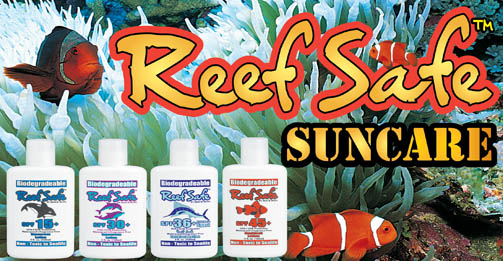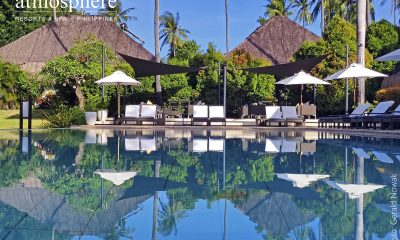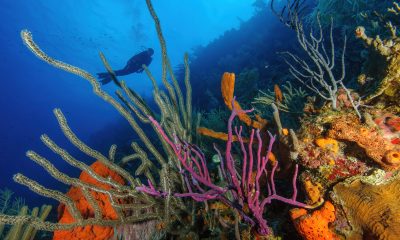News
Top 10 Reasons to use Reef Safe SunCare

Sunscreen Scientifically Proven Safe for Both the Environment and Skin
Beach season is quickly approaching, and it’s time to start thinking about using sunscreen. “Think blue – it’s the new green” this Spring Break and summer by choosing Reef Safe SunCare, a sunscreen that not only protects skin from the sun, but has been scientifically proven harmless to the ocean environment.
“There are so many reasons why people should wear sunscreen, but too many of us are applying sunscreens to our bodies that could be dangerous to our oceans and marine life,” commented Dan Knorr, CEO/President of Tropical Seas. “This is why Reef Safe’s main mission is to produce environmentally friendly products that will keep the oceans clean, thereby creating a safe haven for their inhabitants. Reef Safe has been scientifically proven to biodegrade in oceans, lakes and rivers; thus protecting fragile ecosystems while protecting your skin. Whether spending the day scuba diving, snorkeling, boating or relaxing at the beach, Reef Safe SunCare is the best sunscreen to use while having fun in the sun.”
Here are 10 reasons why Reef Safe SunCare should be every outdoor enthusiast’s choice of sunscreen:
- Proven Non-Toxic to Tested Corals: Reef Safe engaged the world renowned Mote Marine Tropical Research Laboratory to test the toxicity of Reef Safe’s formulations, containing varying levels of sunscreen actives, including oxybenzone, on corals representative of both inshore and offshore habitats. Research findings concluded that Reef Safe formulas caused no visual signs of stress, bleaching or mortality to tested corals at any level of sunscreen treatments over periods of 24 hours, 96 hours and 20 days.
- Biodegrades in oceans, lakes and rivers: Research has shown that Reef Safe SunCare products biodegrade, on average, in less than 90 days in seawater and freshwater. Tests have also found that Reef Safe’s water resistant 80 minute formula allows less than three percent of the product to come off in the water.
- Lightweight protection: There’s nothing worse than applying sunscreen that leaves skin feeling greasy and ghostly white. Reef Safe SunCare applies sheer and smooth, absorbs quickly leaving an invisible, breathable film on skin.
- Water Resistant: Those concerned about getting sunburned while spending most of the day in the water need not worry! Reef Safe SunCare is water resistant for up to 80 minutes, making it the perfect choice for people participating in outdoor and water sports activities. Take a Reef Safe “time out” to reapply every two hours to ensure proper sun protection.
- Sensitive Skin Sunscreen: Reef Safe SunCare is a great solution for sunscreen users who have sensitive skin. Reef Safe’s products are unscented and specifically formulated with a custom botanical blend that contains Aloe Vera & Algae Extract to help soothe and rehydrate sensitive skin.
- Fish-friendly: Reef Safe’s sunscreens have shown no evidence of toxicity to microorganisms or other marine life, so both endangered and common sea creatures alike remain unharmed by these products. Furthermore, Reef Safe will not contaminate or kill fishermen’s bait.
- Stain-free: While many sunscreens rub off on clothing, linens and furniture causing discoloration and unsightly stains, Reef Safe products are specially formulated to keep clothing, linens and furniture just as safe and protected as skin.
- Effective and affordable: Whether buying one bottle or purchasing in bulk, Reef Safe protects the wallet along with the skin and environment. Reef Safe SunCare products typically retail from $5.00 / 4 oz to $13.00/ 8 oz pending the SPF value.
- Eco-friendly packaging: Reef Safe sunscreen formulas are not only safe for oceans, their packaging is also eco-friendly. All products are packaged in 100% plant derived bio-resin bottles, which use 90% less energy, thereby leaving a negative carbon footprint.
- Exceeds all FDA standards: All ingredients used in Reef Safe products are FDA approved for use in sunscreens and are manufactured in their FDA-registered factory. After products are manufactured, they are sent out for testing to ensure that they conform to all FDA standards.
About Reef Safe™ SunCare
Reef Safe SunCare was introduced in 1996 by Tropical Seas of Ormond Beach, FL, as a sunscreen scientifically proven to biodegrade in oceans, lakes and rivers, thus protecting fragile ecosystems while protecting skin. Reef Safe sunscreen formulas were subjected to a comprehensive series of independent laboratory tests to support and authenticate safe for coral, non-toxic to sea life as well as the biodegradability of the lotions. Research found that Reef Safe SunCare products biodegrade, on average, in less than 90 days in seawater and freshwater. No evidence of toxicity to microorganisms or other sea life was detected. Research also found that Reef Safe’s water resistant formula allows less than three percent of the product to come off after 80 minutes of activity in water. At Reef Safe it’s not just about the ingredients, it’s about how those ingredients are processed.
Reef Safe SunCare is also available through dive distributors Trident Dive, Marine Sports Manufacturing and A-Plus Marine.
For more information on Reef Safe SunCare visit www.tropicalseas.com, or www.reefsafesuncare.com. Follow Reef Safe SunCare on Facebook, Twitter, Instagram and YouTube.
Gear News
Introducing the TR-80, IR-50 and CS-30 Regulators from DYNAMICNORD

Whether you are a beginner or a professional diver – with the three new main regulators from DYNAMICNORD, everyone will find their favourite regulator. They all look super stylish.
Excellent performance with the TR-80
Quality and performance are the be-all and end-all for regulators. It is not for nothing that the TR stands for Tec Reg. The innovative design of the TR-80 guarantees absolute reliability – even in ice-cold waters.

Perfect breathing effort at 0.8 J/l / certified for diving in waters below 10 degrees / structural design made of solid brass for best cold protection / membrane-compensated design with dry seal of the first stage / reduced exhalation effort thanks to optimized exhalation membrane and bubble deflector / adjustable Venturi (dive/predive) and adjustment knob for individual inhalation comfort / innovative design of the front cover prevents free-flow in strong currents or when diving with scooters / design made of sandblasted brass, matt chrome finish / 2 HP and 4 LP outlets / mouthpiece made of high-quality, anti-allergic silicone for maximum comfort.


Amazing underwater adventures with the IR-50
The IR-50 is the top regulator for advanced and experienced divers. Natural breathing is the essence of this regulator.

Ideal breathing effort at 0.8 J/l /certified for diving in waters below 10 degrees / compensated membrane / adjustable venturi (dive/predive) and adjustment knob for individual inhalation comfort/ outlet valve and deflector for minimum exhalation effort and reduction of bubbles on the face / design made of sandblasted brass, matt chrome finish / 2 HP and 4 NP outlets / mouthpiece made of high-quality, anti-allergic silicone for maximum comfort.


The Workhorse – our CS-30
For diving centres and diving beginners – the workhorse stands for strong construction, reliability and robustness. Perfect for your training.

Optimal breathing effort at 0.8 J/l /recommended for diving in waters above 10 degrees / non-compensated piston / adjustable venturi (dive/predive) / outlet valve and deflector for minimum exhalation effort and reduction of bubbles on the face / design made of sandblasted brass, matt chrome finish / 1 HP and 3 NP outlets / mouthpiece made of high-quality, anti-allergic silicone for maximum comfort.


Octopus OP-30
The OP-30 is the ideal addition to all DYNAMICNORD regulators. It is identical in construction to the CS-30.

The TR-80, IR-50, CS-30 (DIN & INT) regulators and the Octopus OP-30 are available from DYNAMICNORD dealers and in the online store.
DYNAMICNORD – Your Outdoor Companion.
Marine Life & Conservation
Paul Watson Released as Denmark Blocks Japan’s Extradition Bid

Renowned anti-whaling activist Paul Watson has been released from custody in Greenland after spending five months in detention. Denmark’s Justice Ministry rejected Japan’s request for his extradition, citing insufficient guarantees that his time already served in custody would be credited against any potential sentence.
The 74-year-old Canadian-American was arrested on July 21 in Nuuk, Greenland’s capital, when his ship docked to refuel. His arrest was based on a 2012 Japanese warrant related to a 2010 encounter in Antarctic waters. Japan alleged Watson obstructed operations and caused damage to a whaling research ship during efforts to disrupt illegal whaling. Watson has consistently denied these claims, maintaining his commitment to marine conservation.
Denmark, which oversees extradition matters for Greenland, concluded that while the legal conditions for extradition were met, the lack of assurances from Japan regarding time-served credit made extradition untenable.
In a video shared by his foundation, Watson expressed gratitude and relief, saying, “After five months, it’s good to be out… and good to know they’re not sending me to Japan.” He added that the most difficult part of his time in custody was being separated from his two young sons.
Watson is a pioneering figure in marine conservation, known for founding the Captain Paul Watson Foundation in 2022 after decades of activism with the Sea Shepherd Conservation Society. His bold efforts to defend marine life have earned him widespread support, including from celebrities and conservationists. His work has also been featured in the acclaimed reality TV series Whale Wars.
Watson’s lawyer, Jonas Christoffersen, praised the decision, stating, “We are happy and relieved that Paul Watson is now free.” He added that Watson is eager to reunite with his family and continue his vital work.
The arrest occurred while Watson’s vessel, the M/Y John Paul DeJoria, was en route to the North Pacific with a team of 26 volunteers to intercept a Japanese whaling ship. His foundation described the arrest as politically motivated and emphasized that Watson’s actions were focused on ending illegal whaling practices.
Japan resumed commercial whaling in 2019 after leaving the International Whaling Commission, asserting that whale meat is a cultural tradition. Conservationists, however, continue to challenge these practices, highlighting their impact on marine ecosystems.
Despite the challenges, Watson remains steadfast in his mission to protect marine life and bring attention to whaling practices. His dedication to ocean conservation has made him a globally respected advocate for the environment.
-

 News2 months ago
News2 months agoIconic SS United States to become the World’s Largest Artificial Reef
-

 News3 months ago
News3 months agoBook Review – 52 Assignments: Underwater Photography
-

 Gear News3 months ago
Gear News3 months agoDYNAMICNORD – New German diving brand enters the British market
-

 News3 months ago
News3 months agoExploring Cenote El Pit: A Diver’s Dream
-

 Gear News3 months ago
Gear News3 months agoTry BARE drysuits (and maybe even win one!) this Friday with Sea & Sea at North West Dive Fest
-

 Marine Life & Conservation3 months ago
Marine Life & Conservation3 months agoBook Review: Coral Triangle Cameos
-

 Blogs2 months ago
Blogs2 months agoDive the Egyptian Red Sea this Autumn with Regaldive
-

 News3 months ago
News3 months ago2024 Ocean Art Underwater Photo Competition Announced















